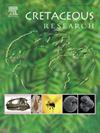A small sauropod trackway from the Upper Cretaceous Jindong Formation (Cenomanian), Goseong County, South Korea
IF 1.9
3区 地球科学
Q1 GEOLOGY
引用次数: 0
Abstract
In 2000, a small sauropod trackway was discovered in the Upper Cretaceous Jindong Formation (Cenomanian) at Eosin-ri, Goseong County, South Korea. This quadrupedal trackway consists of 34 very small sauropod footprints, with an average manus width of 10.0 cm and pes length of 12.8 cm, showing low heteropody (mean IPS/IMS: 1.38). The manus tracks are oval to kidney-shaped, while the pes tracks are generally subcircular to V-shaped, lacking distinct claw marks. The trackway shows a medium to wide gauge (mean PTR: 38.8 %; WAP/PL: 1.18). The small footprint size and estimated trackmaker body size suggest that the trackmaker was an early juvenile titanosauriform sauropod based on the contemporaneous sauropod taxa of East Asia. Sauropod trackways reported from the Jindong Formation, including the Eosin-ri trackway, exhibit a tendency for narrower trackway gauges as pes length increases. This negative correlation between trackmaker size and trackway gauge may imply ontogenetic or behavioral variations within the same clade of sauropods or differences in gait or body plan amongst different sauropod taxa.
韩国高城郡上白垩世金洞地层(震旦纪)出土的小型蜥脚类足迹
2000 年,在韩国高城郡佑新里的上白垩世金洞地层(仙人掌纪)中发现了一个小型有蹄类足迹。这块四足履带由 34 个非常小的类人猿脚印组成,平均鬃宽 10.0 厘米,趾长 12.8 厘米,显示出较低的异体性(平均 IPS/IMS:1.38)。螯部足迹呈椭圆形至肾形,趾部足迹一般呈近圆形至 V 形,缺乏明显的爪痕。足迹显示出中等至较宽的轨距(平均 PTR:38.8%;WAP/PL:1.18)。根据同时代的东亚长脚类群,小脚印尺寸和估计的履带制造者体型表明,履带制造者是早期的幼年巨龙形长脚类动物。金东地层中报告的长脚类动物履带,包括 "江心里 "履带,都表现出随着趾长的增加而履带尺码变窄的趋势。履带制造者的体型与履带轨距之间的这种负相关关系可能意味着同一类群的长脚类动物在个体发育或行为方面存在差异,或者不同类群的长脚类动物在步态或身体形态方面存在差异。
本文章由计算机程序翻译,如有差异,请以英文原文为准。
求助全文
约1分钟内获得全文
求助全文
来源期刊

Cretaceous Research
地学-地质学
CiteScore
4.10
自引率
19.00%
发文量
235
审稿时长
12 weeks
期刊介绍:
Cretaceous Research provides a forum for the rapid publication of research on all aspects of the Cretaceous Period, including its boundaries with the Jurassic and Palaeogene. Authoritative papers reporting detailed investigations of Cretaceous stratigraphy and palaeontology, studies of regional geology, and reviews of recently published books are complemented by short communications of significant new findings.
Papers submitted to Cretaceous Research should place the research in a broad context, with emphasis placed towards our better understanding of the Cretaceous, that are therefore of interest to the diverse, international readership of the journal. Full length papers that focus solely on a local theme or area will not be accepted for publication; authors of short communications are encouraged to discuss how their findings are of relevance to the Cretaceous on a broad scale.
Research Areas include:
• Regional geology
• Stratigraphy and palaeontology
• Palaeobiology
• Palaeobiogeography
• Palaeoceanography
• Palaeoclimatology
• Evolutionary Palaeoecology
• Geochronology
• Global events.
 求助内容:
求助内容: 应助结果提醒方式:
应助结果提醒方式:


